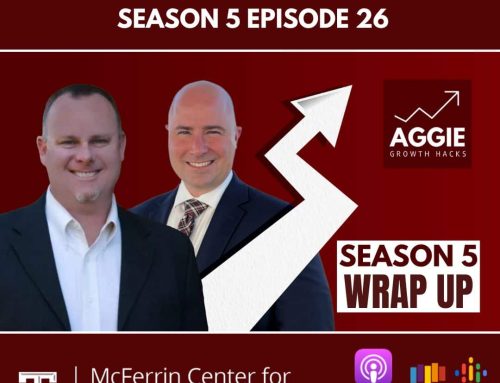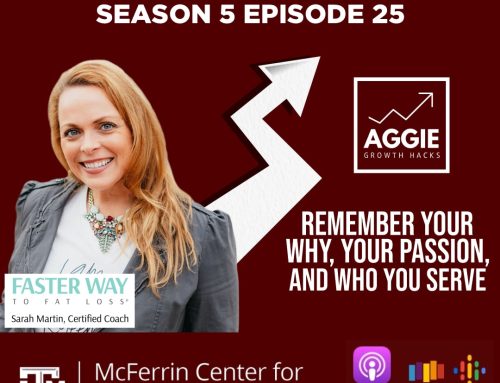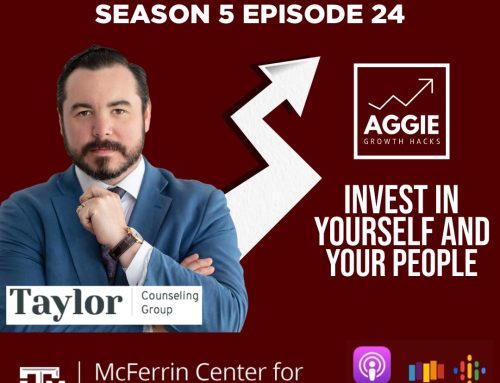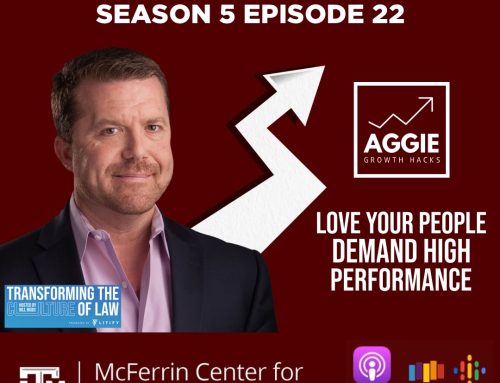Howdy, Ags! Today, we have Max Gerall ’18 of The Reach Project! In this episode, Max shares with us how he founded a wonderful non-profit organization that saw the unseen but essential members of the community. So make sure to tune in and enjoy!
How Listening & Empathy Creates Ripples
Max recalled that he had just recovered from sickness before his first year, and the first person who showed him the Aggie spirit was a food service employee. This encounter, and his love for listening to the stories of others, led him to see the conditions of Aggie’s essential workers and moved him to start an organization that would provide access to essential Aggies to tools and resources they need to overcome the multi-generational poverty cycle and achieve their fullest potential. The organization utilizes Aggie students who joined the movement. It thus creates an opportunity for the students to practice their technical skills, develop their soft skills, and enhance their capacity for empathy. So when they become leaders in their field, they hopefully are more empathetic.
He believes that empathy is vital in personal life, in building relationships, and in business. Max shares that being able to put yourself in one’s shoes and understand where they’re coming from helps you better understand the world and yourself. And so, if you can be empathetic in every relationship, the odds are that those relationships will be stronger and more fruitful in the long run. But when thinking about it from a business perspective, empathy is also crucial because customers drive the business; if their wants and needs are not understood, then a company can also not provide them with the product they will use.
About The Reach Project:
The REACH Project is a nonprofit organization founded in 2017 by Max Gerall, an A&M undergrad whose friendship with a cafeteria worker led to his realization that the 3,000 contract service workers on campus were virtually unknown and unseen, but essential members of the community. They cook the meals, clean the dorms and classrooms, fix the toilets, and keep the campus beautifully maintained, yet they are poorly paid, anonymous, and their value unacknowledged.
Not a legislator, politician, or institutional administrator; what could he do to ameliorate the hardships workers endured because of their unsustainable wages? He realized that what he and other Aggie students did have were time, knowledge, and a commitment to selfless service. With those resources, he developed High Impact Service-learning Opportunities (HISOs), a platform that provides mutually beneficial engagements between students and the service workforce. HISO’s leverage student knowledge critical to the workforce in overcoming multigenerational poverty, while offering students opportunities for experiential learning, soft skill development, and relationships that instill and nurture empathy for a life of service,
REACH kicked off its first programs in 2018, in response to the expressed need of the uninsured workforce for healthcare. Staffed by students from the Health Sciences Center, REACH hosted pop-up clinics and Health & Wellness Fairs on campus. In 2018 and 2019, more than 400 workers and their families attended these events. At the same time, REACH was helping students create their own AgsREACH organization, working with BUILD on the design and construction of its free health clinic (generously funded by a Strategic Philanthropy Grant) and the development of its lifelong learning, personal finance, and homeownership programs.
Early in 2020, COVID-19 came to Texas A&M. As the campus emptied out, service workers were laid off and furloughed. REACH pivoted and implemented its COVID Emergency Response. Over the course of the next 12 months, approximately 700 families were served 200,000 pounds of produce, 40,000 locally sourced restaurant meals, 7,500 USDA Meal Boxes, and 6,000 pounds of frozen meat, by 240 student volunteers. REACH initiated opening on campus Warming Centers, and drive-thru health clinics.
In the second half of 2020, REACH delivered its first courses in finance, ESL, and homeownership. Since then, the number of participants doubled each course offering (with a 98% retention rate), as has the number of student volunteers and interns. Today, more than 300 students representing 28 different majors regularly serve more than 800 families by providing access to food and healthcare, including vision, dental, and breast health clinics, food-producing home gardening, pet Vet clinics, as well as Everyday ESL, and the REACH Journey Home. Three participants have become homeowners; 7 more have qualified.
Outline of the Episode:
[00:00] Intro
[01:50] The Aggie spirit and the things he missed being a student
[02:42] The Reach Project
[05:24] Empathy and why demonstrating it is important
[07:05] How empathy is taught
[09:49] COVID and its effect to the Reach Project
[13:03] Hacking the biggest problem they are facing
[16:26] BHAG
[19:18] The various accomplishments of The Reach Project
[21:37] Max’s favorite hack
[22:45] Max’s advice
[24:07] Max’s superpowers
[24:50] What gets him excited about the Reach Project
[27:35] How to get in touch with Max
[29:37] Greg’s biggest take away from this episode
[31:15] Chris’s thought on the ripples listening and empathy creates
Resources:
The Reach Project Website: https://reach4home.org/
AGH Website: https://www.aggiegrowthhacks.com/
Connect with Greg and Chris!
Apple: http://bit.ly/AGH-Apple
Spotify: http://bit.ly/AggieGH
Stitcher: http://bit.ly/AGH-Stitch
Podbean: http://bit.ly/AGH-PB
YouTube: https://www.youtube.com/channel/UCCZx9NMwnBXs5RWC3Rwqkpw






